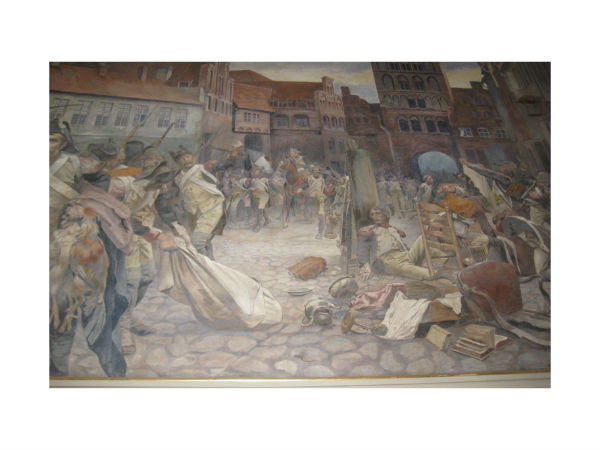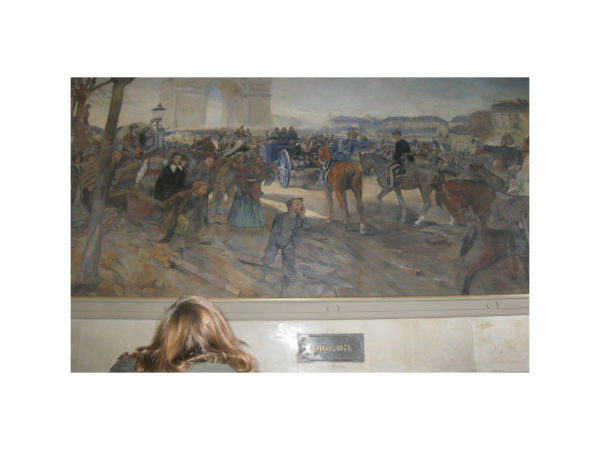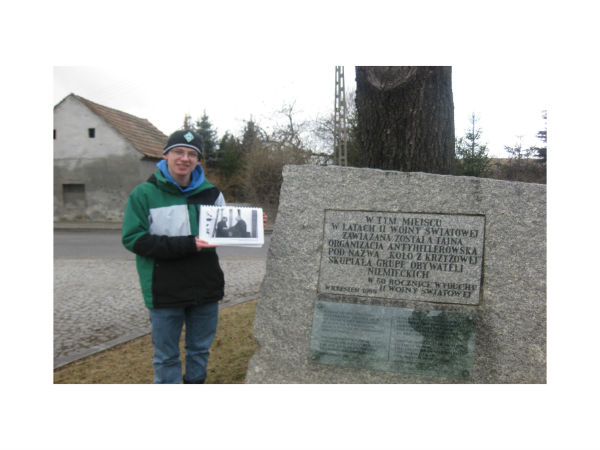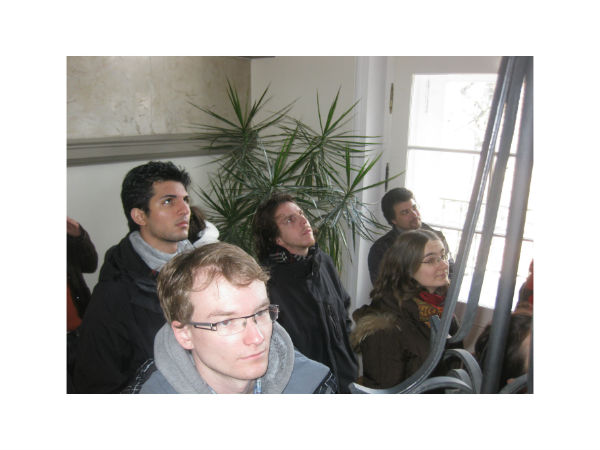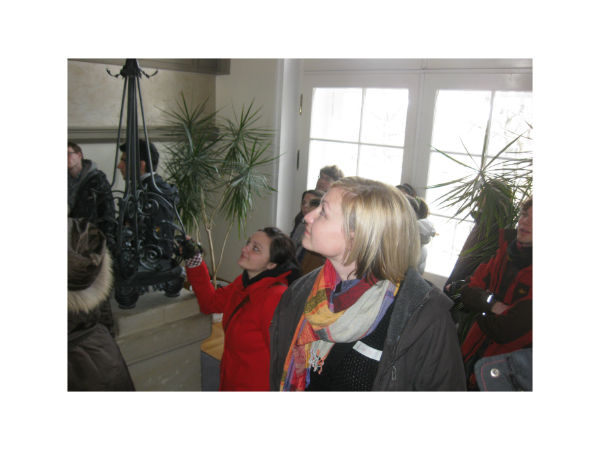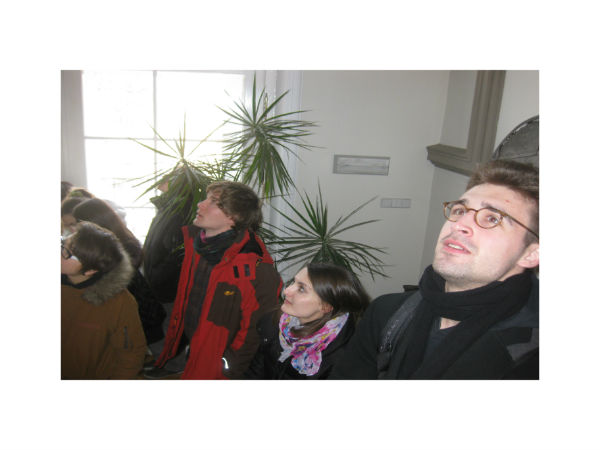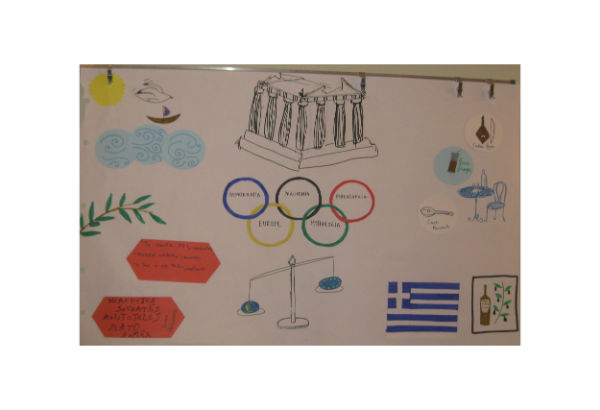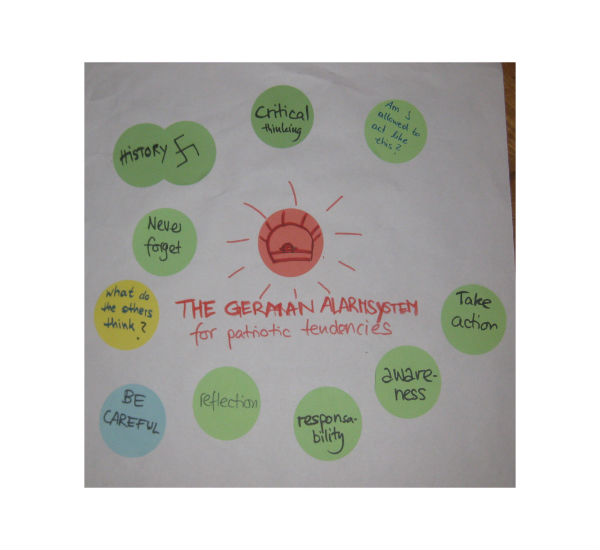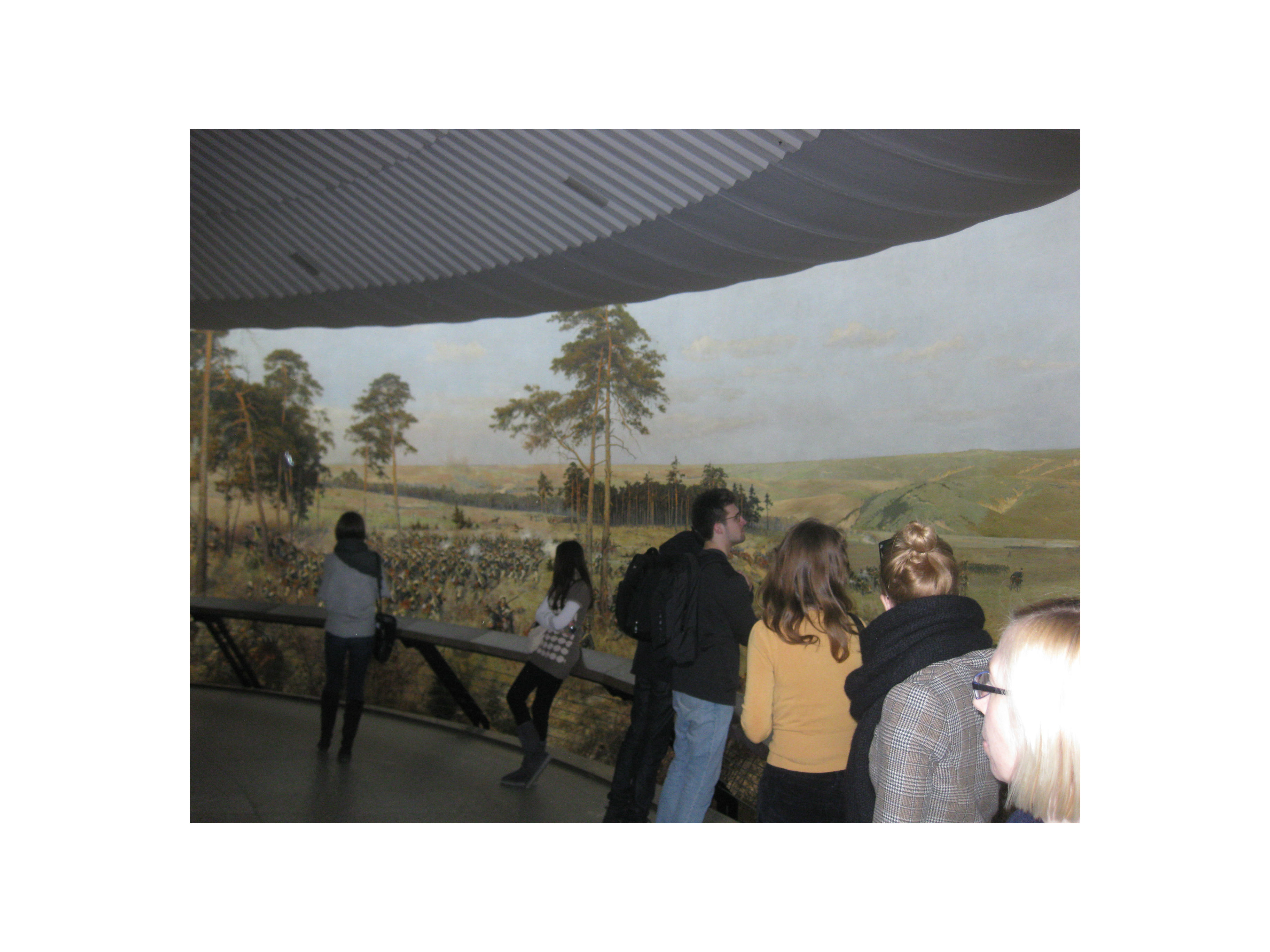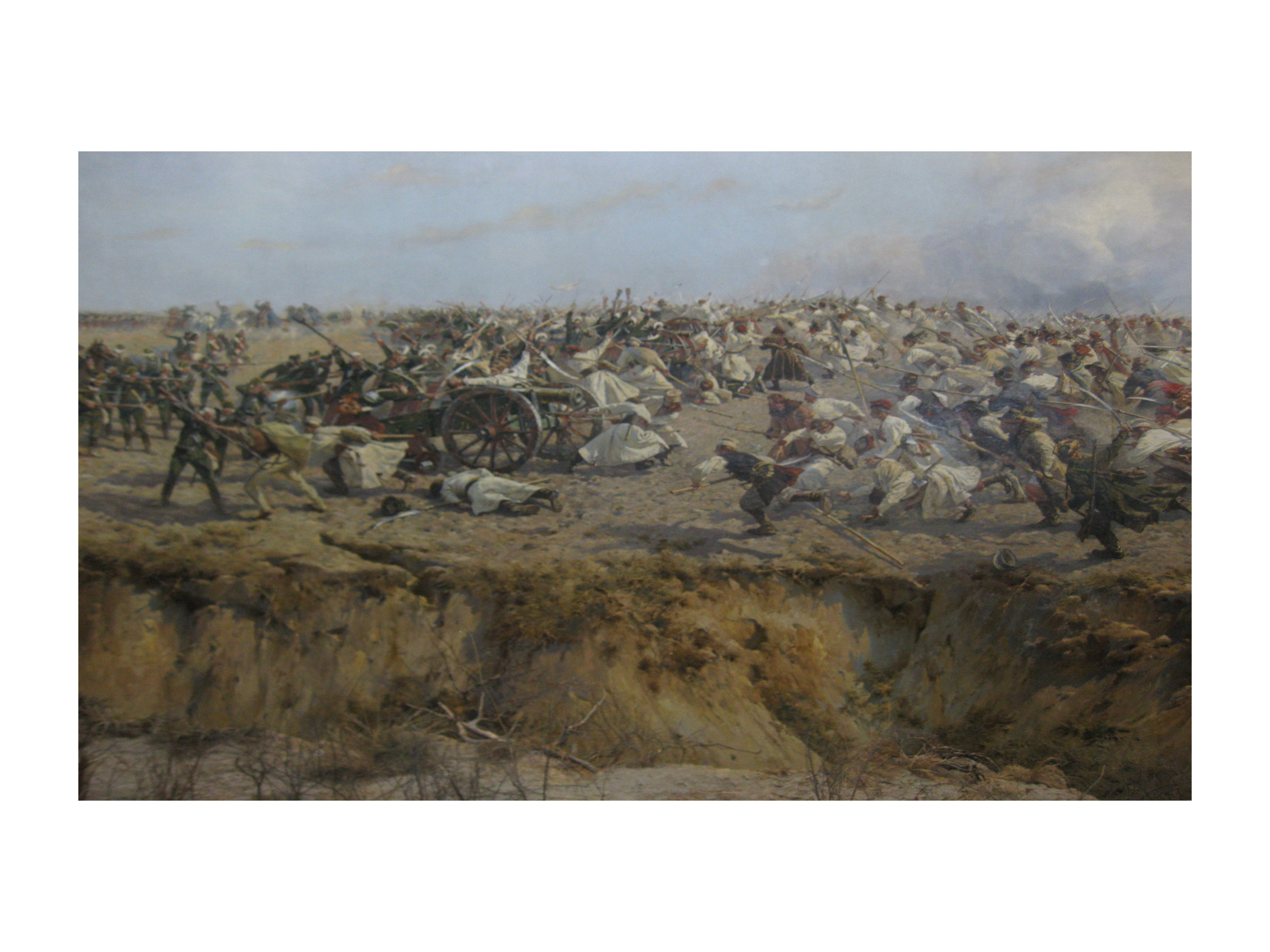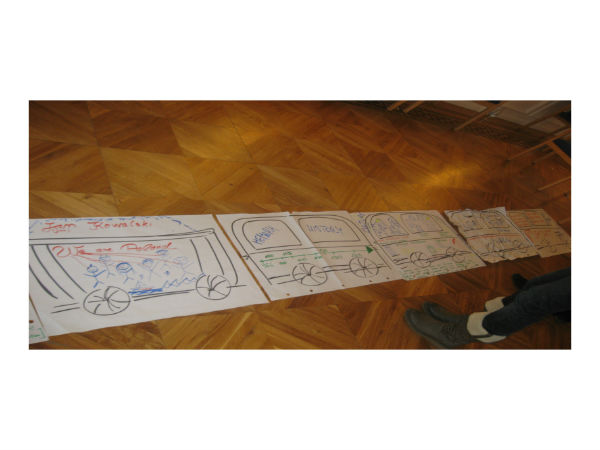Nation State
There exist some common ideas how nations and nation states were brought about. For instance, Germany is inconceivable without Bismarck who used war to unify the country in 1871, and serves, therefore, as an example as to what Habermas would describe any nation state to have a qualitative difference between internal and external relationship.
In Kreisau, the story of Field Marshall Moltke is linked to what happened in 1806 and then further on in what Bismarck achieved through the instigation of war against Austria and France in 1871. Interestingly enough such national narratives were told in the form of monuments and paintings.
In Kreisau itself this was captivated in particular by two huge paintings depicting the early experiences of Moltke. The painter describes him as a boy who witnessed apparently the entry of French troops into Lübeck.
and then the entry of Prussian troops into Paris in 1871. It is alleged that Fieldmarshall Moltke was amongst those who rode into Paris even though historians say he was on that day at another location.
A point of discussion during the tour of the Kreisau estate was the use of these paintings as a form of propaganda, and whether or not these paintings should be restored along with the castle after it had been destroyed during and after the war. Restorations started with the agreement between the German and Polish side in Nov. 1989 to use this estate as a meeting place for European youth.
In November 1989 Ministerpresident of Polen, Tadeusz Mazowiecki and Chancellor, Helmut Kohl came together in Kreisau / Krzyzowa to initiate a tremendous gesture of reconciliation for the sake of the youth of Europe. Paul holds in his hand a photo of the two men and stands besides this simple stone monument located outside the estate of Kreisau.
Inside, in front of the paintings, the participants of the EU Youth Seminar 'Nation and Identity' looked at the paintings with questioning, equally attentive eyes.
Interestingly enough, Jürgen Habermas picks up the difference between internal and external relationships when he links the creation of the nation state to citizens abiding by the law. As this satisfies their sense of freedom by gaining in civility, internal relationships are not arbitrary but are guided by this common act of passing and living by the law. This means state legitimacy is here an expression of freedom. In due course of time and through history, it has become the expression of sovereignty to be acknowledged once a nation can and does live freely according to its own laws. On the other hand, external relationships are not structured in the way internal laws are passed. Here Jürgen Habermas speaks about 'Willkür' - arbitrariness. That is of great relevance for his argumentation in favor of world governance.
The burden on a world institution like the United Nations for finding a solution to arbitrariness is tremendous. No state in its external relationships can be consistent enough. As this precludes the notion of world governance, it underlines a need to overcome arbitrariness which prevails in foreign relations or in-between states. Ever since the French Revolution erupted due to the arbitrariness when it came to passing and applying the law - some poor peasant would have his hand chopped off after having been caught stealing an apple, while an aristocrat would walk free after having murdered a woman just to silence her so no one would know about their affair - it can be safely assumed that no moral legitimacy prevails where there exists arbitrariness. It means nothing short of world governance is needed to overcome this sad state of affairs. Clearly this problem or rather contradiction between internal and external affairs has not vanished in an age of globalization.
In history, the coming of the nation state can be best understood as a search for self recognition at collective level. It implies an individualism emerging out of a collectivity willing to take on a collective identity and to be distinguished as such from other national identities. In Hegel's philosophy, this meant individualism presupposes the negation of differences and of othernesses, insofar it was only possible to take on individual identity when finding oneself within such a collective identity which could be safeguarded by the state.
Two encounters with national identity related issues can be outlined:
- while dealing with questions of mediation and communication
- when decision making processes need to be resolved in face of threats of unrest, uprisings and even violence.
The question of violence is one of translating the question of identity into civilized forms of disputes. In turn, they need to be resolved in various ways but certainly in terms of form and content in a democratic way. The latter is based on an agreement to be able to disagree.
This then goes in the direction of public truth and public space needed if opinions can be expressed as well as be questioned. The process of civilization is to give space for participation in cultural terms: dialogue, artistic freedom, and unfolding of creative potentials. Here the nation state has stifled many of these aspirations, since mainly local and regional, equally patriotical towards the nation state. To preserve then a continuity of identity, the culture of the nation state fostered childhood, language, customs and values. The main identification point was what could be shared with local people. They distinguished themselves from the people of the nation and from the masses, as they had their own local identity. In Populism, they are considered to be rooted in the soil and thus constitute locally bounded identities recognizable by the spoken dialect. The way of speaking - 'Mundart' - reflects a qualitative different belonging to the nation state.
Historical reminders - how nations are perceived today by the youth (2012): a first outcome of the meeting in Kreisau
Greece
Greece in 1821 – Lord Byron with this romantic notion of a free and independent nation – Greece, once freed from the Ottoman Empire, was given a Baverian king: a solution imposed by the then Western powers - this kind of intervention from the outside continued and accelerated naturally through the two World Wars followed by American dominance especially through NATO and which led to the military dictatorship from 1967 until 1974. Entry into the European Union came later on and in 2001 the entry into the Euro-Zone with all the financial and structural consequences for economic governance.
The youth from Greece in Kreisau (23.-29.2.2012) made following visual representation of Greece as follows:
The composition shows a kind of self consciousness which uses symbols to link the Ancient Past with the present best expressed as a way of life. The symbols are both abstract and concrete i.e. taken from real life like the olive leaves. It means national self consciousness is expressed at the level of symbols and images which can guide associations towards some understanding of that particular country. Yet it can show as well how locked in 'national' self-consciousness can be. After all there are marked differences to how one's own self understanding should and can be communicated amongst oneself i.e. amongst those who speak Greek and consider themselves to belong to this country, and how to the outside or non Greek world. If the latter is only perceived as a kind of projection shield for the own imagination, then it seems to underline a need to be someone. That entails in turn a dependency upon being recognized by the others in a double sense: as citizen of that state and as person belonging to such a nation. Living and shaping such a dependency can become an obstacle to further emancipation at world level. And it can remain an explosive mixture of wishing not only that the own sovereignty can be safeguarded by the own state as much as being respected by other states, but in terms of seeking greatness be an expression of personal dreams to belong to a country one does not have to be ashamed of. Right now many Greeks are precisely that: ashamed. This is expressed the strongest by the Greek youth who do not wish their country to be identified solely with the financial crisis and the kind of help being organized in the form of the Troika imposing austerity measures.
Germany
Germany 1871 – Bismarck and his policy of waging war to unify internally Germany is one part of the nation state being formed. Of interest is that he was not willing to go into colonial adventures as did the king. Once Bismarck was ousted, a new form of Colonialism and Imperialism was added by Germany in Africa and elsewhere, and this in competition to France, England, but also Belgium and Holland. Moreover as history proved this war with France was not over, but continued in 1914-18 and 1939-45. Today that historical reminder has helped not only to shape the European Union but also made the new generation in Germany more sensitive to the issue of Nationalism and Patriotism. As a matter of fact, it has installed a kind of alarm system which responds the moment dangerous tendencies are perceived as threatening the social and cultural cohesion of the country, and with it the functioning of the state.
Poland
When the group visited Wroclaw, they saw the Panorama Raclawicka in the Oddzial Museum. It consists of a historical painting of 360 degrees to show the uprising in Poland against Russia, and therefore a first act of liberalization.
Again the power of pictures (paintings) explains how in the past the national narrative was told and is still depicted in countless stories illustrated by not only paintings but monuments. In keeping with the times, such a panaroma empowers moreover illusions while the impressive scene engraves itself into the viewer's mind as something unforgetable. A turning point in the history of a country told retrospectively makes this kind of memory construction into a complex aspect of the national identity building process. That differs from other historical accounts and narratives.
The youth in Kreisau depicted Poland as a kind of train with certain logical linkages
Since Adorno spoke about the 'tracked expansion of the mind', any reference to trains may be linked as well to the Union train making history in the United States. It is a new linkage of any country during the age of industrialisation. Today, within Europe, there is still the problem for trains to cross borders as often they require change in locomotive and therefore driver.
Nation States in the european context
Zygmunt Bauman recollects that the making of the nation state within Europe was an outcome of tribes and ethnic groups beginning to merge as the nation became a modern discovery.
„For many centuries, perhaps millenia, the European continent was inhabited by tribes and ethnic groups. Nations, however, are a modern discovery. Simplifying the matter, one may say that the birth and the maturation of modern times was marked by blending the tribes into nations (more exactly, by some tribes, which managed to lift themselves to the rank of nations, devouring other less lucky or resourceful tribes); then by nations gaining political sovereignty, and by the replacement of dynastic realms with nations-states as well as themelting of their disparate subjects into nations - unified and indivisible. The sequence of steps was not everywhere the same; the achievements of ethnic groups which managed tobecome nations tended to set a pattern for the dreams and postulates of other, less successful populations. Gradually yet apparently irreversibly, the idea of the nation and the independent state in European consciousness merged into one.
And so it happened that states and nations could not live without each other. Nations needed states to forge the "locals" into nationals, to melt local dialects into a national language, to replace the local rhythms of rites and celebrations with unified national calendars of commemorative festivities. Only the state, with its monopoly of coercion and canons of obligatory education, could preside over that blending of tribes into nations, which Jürgen Kocka aptly described as "Reduzierung und Aufbau von Unterschieden, Reduktion von Heterogenität, Homogeniesierung von einerseits regionalen Differenzen". The nation building, always a risky and sharply competitive exercise, could not do without crusades andKulturkämpfe. It was always necessary to degrade some languages to the status of dialects, to promote some dialect to the rank of the language; to condemn some memories to oblivion while pulling some real or putative traditions by the ears from the abyss of the forgotten past.
None of this could be done without the state, without legal codes, police, courts and jails, and (though by no means least) without doctorat d'état (as Ernst Gellner quipped, the firstviolin in the nation-building symphony was played by professors, not guillotine operators). On the other hand, the state needed a nation - so that it could demand discipline in the nameof sentiment, conscience and patriotic duty, prompt its subjects to act in the name of common tradition, and blackmail the lukewarm into compliance through invocation of the common fate. Indeed, a perfect marriage, one made in heaven.“
Zygmunt Bauman, Europe of Strangers, p. 3 - 4
The difficult marriage between nation and state
Zygmunt Bauman describes the relationship between nation and state as a most difficult one. According to him to keep the nation state together three pillars were needed: balanced budget, military force and culture. He sees all three are becoming ever more difficult in an international world with things going global. While state budgets are out of balance, war fare has changed with the coming of terrorism into invisible wars (by use of drones or how Bin Laden was killed in Pakistan) and culture no longer can be linked to one nation state, but has gone global. All three seem ever more beyond the reach of a nation state.
The wedding was alright "as long as 'state independence' meant the right to pass laws which bound all its subjects and to deny any other laws the power to bind them, as long as the state kept in its hands, to use Carlo Schmid's formula, the sole power to define and to enforce Pax, Justitia et Disciplina.“ (op. cit. p.4)
This prime condition of being able to pass laws and thereby bind its citizens is best expressed in Hegel's Philosophy of Law. The power of the state rested above all on a monopoly of power (violence) so that while the state was armed, all its citizens were unarmed. For Bauman it meant following condition:
"States could keep and wield that power in as far as they rested on the 'tripod of sovereignties' - economic, military and cultural: the ability to balance the books, to control its borders and to legislate the norms and the patterns by which all its subjects were to compose their customay conduct. Only such states could be well protected greenhouses inside which the 'national communities', or myths of national communities, could take roots and blossom." (op.cit. 4)
This monopoly was broken in due course of time in several ways.
„These days however all three legs of the "tripod of sovereignties" are increasingly wobbly, and so the power of governments to rule and control the territories and the populations under their administration is waning. The politics stays territorial, while economy,military force and culture become ever more global and thus extraterritorial. The things most important for the well-being and life-prospects of its citizens are largely beyond the government's control: they are in the hands of the so called "market forces" - that enigmatic entity reminiscent of primeval elements, natural disasters or blind fate, rather than of well considered, purposeful and rational human decisions. Governments can do less and less to influence the course of events which affect directly the livelihood of their subjects. The order of things protected by the state has lost much of its aura of tough and indisputable reality.
Order no longer appears preordained, self-evident, secure. Nations can no longer rely on state protection; the well-being of national identity, or any other identity for that matter, is no longer safe in the national governments' hands, too weak now to hold it fast.“
op.cit. p. 4
Increasingly it became obvious that the difference between police and army meant also a difference in the legalization of use of power. That difference implies civil law should prevail by the police safeguarding the citizens while externally the army would protect the state and its citizens against any kind of encroachment from other forces and societies.
Until recently military service was compulsory (still is in Greece) and the citizens had to do what the state ordered them to do, even if it meant to go to war. That is why it is significant when Bauman links justice to discipline as a way to keep order.
But the problems do not end there.
-
Z. Bauman sees a phenomenon of insecurity spreading since all become strangers to each other. He makes this statement as if he wishes to spread panic without reflecting his assumption that the key binding force of people to one another, namely the 'libido' (S. Freud) has been torn. And if the case, then there are still other ways and means by which people can communicate, express solidarity, relate to each other to ensure their identities are retained in the memories of others. A definite lift to this has been given by Adorno's 'imaginary witness' to which truthfully stories should be told since that brings about the substance in both society reflecting upon history and individuals retaining a sense of identity. The latter pertains not only to where they come from or to which community they belong to, but to where they stand with regards to what is happening close by, that is in their immediate surroundings often called next to home, neighborhood and city quarter, but also within the larger scope of a city having become a metropolis within a larger region extended over to become a part of Europe. That are still enough interesting patterns by which the universality of technical and communication systems take on a local 'coleur' and the language spoken is not merely an arbitrary instrument, but a base for conceptualizing life out of which follows the sequence of events best termed as the constitutionalisation of identity.
-
The stranger amidst us or all of us having become strangers to each other would mean an uplift to all the false self-understandings people have about themselves. Rightly so Habermas would argue a false legitimacy for an executive federalism at European level can be constructed out of denying the existence of Europeans as a collective group deserving the name of 'people of Europe'. His philosophical reflections about law linked to human dignity and human rights is, therefore, a passpartout for what he sees as an inherent dynamic brought about by national constitutions giving rights to citizens they can only claim when at one and the same able to give recognition to each other as 'human beings' not to be limited to a single nation state. However, it is doubtful if this reliance upon a dynamics is sufficient to offer a solution to the pertinent question what constitutes an identity in difference to legal rights granted to an individual within a given system. For there exist doubts about the application of law as either a normative moral principle in recognition of all human beings are equal and the secretive ways of delineating rights and norms according to what is convenient for those wielding some sort of power, even if power at the disgression of certain legal bases e.g. member states granting per treaty certain Rights to the European Commission to propose directives which become laws which regulate life. The odd contradiction is that this upheaval of national secured Rights is made to achieve some legitimization, while at the same time the neoliberal idea is to deregulate everything for the sake of the rule of the market. As Habermas would point out that leaves the state's task to secure basic Rights for everyone behind the demand for a way to understand Rights 'schlechthin' or as a matter of fact. Here he sees that this division between facts and legal norms as interpreted differently by lawmakers i.e politicians and judges implies a further differentiation (whereas Bauman sees much more a loss of differentiation leading to the current crisis or anomalie).
After all the hardships and experiences with nation states, it is crucial to revisit the political problems besetting any kind of government, in order to understand what it takes not merely at the level of ideas but how various responses would conflict with the very basic idea of what it takes to bring about a good governance. Here the political concept is linked to a recognition of those who bring about not merely change but know on the basis of ethics to advance active citizenship.
The political task: civilisation and non violence
To build both a nation and a state meant to bring about a rational way of passing laws so that people could abide and governance would be possible by rational means.
Interestingly enough 'wealth of the nation' became a pivot point ever since Adam Smith formulated his economic theory to explain how 'division of labour' would enhance productivity. This sense was also transferred onto the political sphere with a division being implemented between those who govern and those who are governed. That became a class distinction and promoted furthermore the notion of the educated class leading on to becoming or being the elite.
It was an odd mixture of arrogance and really highly educated people except that the romantic vision blurred a sense for politics at the neglect of human rights and civil liberties.
There come to mind the freedom fighters but as well the reactionary forces as was the case in 1918 when the Russian Revolution or the Spartakus uprising in Munich were quickly squashed by a political class who knew how to deploy internally the police force. As Zgymunt Bauman describes, the enforcement of the nation state building process meant the need to eliminate those who were opposing such an idea. How to deal with opposition remains till today one of the most crucial questions and alters the democratic process if that is not resolved peacefully and with respect of the opinion of the other.
Often in this context is forgotten what the history of political ideas (Sabine) underlines: the need to pass laws follows directly out of a conceptualization of politics and governance, whereby here ideas vary from Machaevilli to Hume. While the former advocates the use of the political lie, the latter implies completely a different notion of sovereigny when Hume states that 'habits are the sovereign of the people'. Hidden in that formulation is an economy of rulership: if people do things out of their own accord and hence out of habit, then you do not need so many police forces to enforce a rule of law.
The rule of the law became a new subject matter after the French and American revolutions. Both attempted to bring about a new constitution but while the French Republic ended up with the Napolean code of law, the American constitution had to wrestle for all the subsequent years with a contradiction between ideal and reality. The notion of all men are equal was violated in terms of the Blacks till Martin Luther King came along to share with all the fact that we all have a dream.
History and Xenophobic forces – problems of ethnic cleansing – to whom to belong – exclusion – failure of cultural integration – national stereotypical thinking – other outcomes of Nationalism
Despite the brutality and cruelty of First World War, itself an outcome of how the nation state was created, namely violently and leading externally to the forms of Imperialism and Colonialism Africa and Latin America would have to suffer under, Woodrow Wilson called in 1918 for every nation to have the 'Right to national self determination'. The question here can be reformulated in view of events in former Yugoslavia and elsewhere where genocide was committed, namely if the extreme form of self determination is not in reality nothing short of 'ethic assertiveness'? The loss of personal identity leads to this extreme form of seeking an identity through a state being linked to but one kind of national identity.
When Adorno and Horkheimer published their 'Dialectic of Enlightenment' in 1944, that is while still in exile in the United States, they warned wisely enough that even when Fascism was defeated, there will still have to be dealt with 'xenophobic forces'.
Prague Spring '68: do something about the youth and the language of the hair (Pasolini)
Richard von Weizsäcker in Berlin West 1981: either German or out - the false alternatives
German Unification (1989) with troubles in East Germany
Break up of former Yugoslavia and ethnic assertiveness – bombing of Kosovo (1999)
New York and Twin Towers: 911 – terrorism
Madrid – bomb blast of the trains in 2004
Failure to ratify the EU Constitutional Treaty 2005
London 2005, July 7 – bombing on London Tube and in its wake a new form of patriotism under Gordon Brown to stress British defiance despite multi-culturalism key feature as to why London got the bid for the Olympic Games in 2012 just two weeks before the bombing
Rainbow Coalition in Europe and Intercultural Dialogue (2007)
Death of multi-culturalism (after Van Gogh in Holland) – Merkel, Sarkozy
Brevik, the Norwegian – in search of a pure identity and Enzensberger's thesis about the radical loser in modern society.
The thesis of Enzensberger can be linked to revenge as something which has not been resolved, but only suspended by the law of the state ready to mediate between perpetrator and victim. The new challenge is when independent communities base their understanding of law not on a secular but religious identity. The latter is often confused with a cultural identity. This leads on to the question of world religions and their aspirations as recognized by Habermas.
Case studies: Two examples of recent trends in Europe 2012
Anti-migrant attitudes of extreme Nationalists e.g. Wilder in Holland
„Ten eastern European countries have denounced a Dutch nationalist website set up by far-right politician Geert Wilders. The site urges the Dutch to lodge complaints about Central and Eastern Europeans in the Netherlands.
Launched last week by Wilders' Freedom Party, the website calls on citizens to report "Central and East Europeans ... for general nuisance, pollution and labor market displacement."
Diplomats from Bulgaria, the Czech Republic, Estonia, Hungary, Latvia, Lithuania, Poland, Romania, Slovakia and Slovenia have issued an angry response in an open letter, asking the Dutch government to "distance themselves from this deplorable initiative," which they say is "clearly discriminatory."
The diplomats said the website would not help solve some of the issues caused by migration of citizens from eastern EU countries.
"Rather, it encourages negative perception of a particular group of EU citizens working in the Netherlands," the letter said. "The statistics clearly show that our fellow citizens contribute significantly to the growth of the Dutch economy and the Dutch budget. The truth also is that our citizens do not take jobs from the Dutch nationals."
EU Justice Commissioner Viviane Reding and EU Digital Affairs Commissioner Neelie Kroes, who is Dutch, have criticized the website. In comments posted on social networking site Twitter, Kroes mocked the Freedom Party's initiative.
"Ridiculous to think that denouncing others on a website will make Netherlands or EU a better place," Kroes wrote. "What next? Your wife annoys you? Forget Valentine's Day, log on and denounce her!"
The Freedom Party is the third largest in the Netherlands and is a key backer of the minority right-wing government of Prime Minister Mark Rutte.
Wilders was recently acquitted of hate speech charges after he described Islam as a violent religion and made comparisons between the Koran and Hitler's "Mein Kampf."
dfm/ncy (AFP, AP)
Source: Deutsche Welle, 14.2.2012
http://www.dw.de/dw/article/0,,15742494,00.html?maca=en-newsletter_en_bulletin-2097-html-newsletter
Interestingly enough EU Digital Affairs Commissioner Neelie Kroes, who is Dutch, who criticized the website came herself recently under scrutiny after she had hired ousted former German Minister of Defense, von Guttenberg as her special external advisor for matters linked to Internet and Freedom of Expression. Guttenberg was forced to resign after having denied first, and then could not longer contradict the charge that he had committed countless forms of Plagerism when writing his dissertation.
Don't humiliate the Greeks – the current crisis in 2012
"The head of the EU Commission has tried to calm nerves after a vitriolic exchange between Greece and Germany over Athens' debt woes this week. Comments by Germany's finance minister have come under heavy fire in Greece.
Jose Manuel Barroso struck a rather conciliatory tone at an EU meeting in Brussels on Thursday, saying he hoped "that the members of the European Union will accept the commitments given by Greece."
He also praised "the courage of the Greek government and the Greek people in these very challenging times."
But Barroso also stressed that "there can be no collective solidarity without national responsibility."
That was a day after German Finance Minister Wolfgang Schäuble told German public radio that efforts to help Greece had their limits. Schäuble and Germany have emerged as central figures of scorn amongst anti-austerity groups in Greece who feel Berlin is playing too strong a hand in their country's financial matters.
"We want to do everything we can to help Greece," Schäuble had said. "We can help but we are not going to pour money into a bottomless pit."
Those comments earned an angry response from Greek President Carolos Papoulias, who said he did not "accept having my country taunted by Mr Schäuble, as a Greek I do not accept it."
Papoulias also blasted the Netherlands and Finland for their tough stance: "Who is Mr Schäuble to taunt Greece? Who are the Dutch? Who are the Finns?" asked Papoulias.
Dutch Finance Minister Jan Kees de Jager, meanwhile, warned that Greece's European partners may opt to delay payment of the funds until after Greek parliamentary elections in April.
Schäuble has become the object of scorn amongst some Greeks
"Ideally, after the elections, you want to deal with rulers that you know will give their support to the package," De Jager said in an interview with the Dutch business daily Het Financieele Dagblad.
He also said that "several EU countries, among them the Netherlands … are not at all satisfied with the promises Athens made last week."
Juncker's optimism
De Jager's comments were in sharp contrast to sentiments expressed by the head of the Eurogroup, Luxembourg Prime Minister Jean-Claude Juncker, late on Wednesday. Juncker said Athens had provided the eurozone ministers with an explanation of how it intended to close a 325-million-euro ($425.5 million) budgetary gap and "strong assurances" that it or any future government would implement the demanded austerity measures.
He also said that eurozone finance ministers would likely be in a position to approve the second bailout package early next week.
De Jager's comments on Thursday, seemed to contradict this idea.
"We want to seek more guarantees in place by implementing in law some of the measures that are absolutely needed in the next two weeks before with can give the final okay to the package," he said. De Jager described confidence in Greece as being at "an all-time low."
Greece could become insolvent as soon as March 20, when a 14.5-billion-euro bond repayment is set to come due."
dfm/pfd/sjt (dpa, AFP)
Source: Headline 16.2.2012 Deutsche Welle,
http://www.dw.de/dw/article/0,,15745445,00.html?maca=en-newsletter_en_bulletin-2097-html-newsletter
« Methodological questions | Extreme Nationalism and xenophobic forces »

